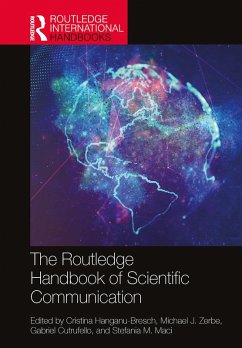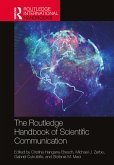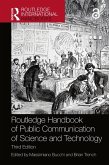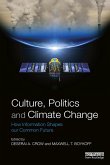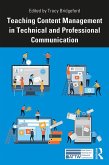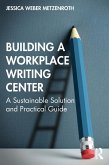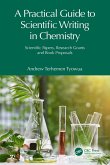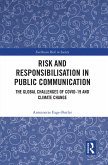The Routledge Handbook of Scientific Communication (eBook, PDF)
Redaktion: Hanganu-Bresch, Cristina; Maci, Stefania M.; Cutrufello, Gabriel; Zerbe, Michael J.
45,95 €
45,95 €
inkl. MwSt.
Sofort per Download lieferbar

23 °P sammeln
45,95 €
Als Download kaufen

45,95 €
inkl. MwSt.
Sofort per Download lieferbar

23 °P sammeln
Jetzt verschenken
Alle Infos zum eBook verschenken
45,95 €
inkl. MwSt.
Sofort per Download lieferbar
Alle Infos zum eBook verschenken

23 °P sammeln
The Routledge Handbook of Scientific Communication (eBook, PDF)
Redaktion: Hanganu-Bresch, Cristina; Maci, Stefania M.; Cutrufello, Gabriel; Zerbe, Michael J.
- Format: PDF
- Merkliste
- Auf die Merkliste
- Bewerten Bewerten
- Teilen
- Produkt teilen
- Produkterinnerung
- Produkterinnerung

Bitte loggen Sie sich zunächst in Ihr Kundenkonto ein oder registrieren Sie sich bei
bücher.de, um das eBook-Abo tolino select nutzen zu können.
Hier können Sie sich einloggen
Hier können Sie sich einloggen
Sie sind bereits eingeloggt. Klicken Sie auf 2. tolino select Abo, um fortzufahren.

Bitte loggen Sie sich zunächst in Ihr Kundenkonto ein oder registrieren Sie sich bei bücher.de, um das eBook-Abo tolino select nutzen zu können.
This handbook scrutinizes what we value and prioritise in science as highlighted by the rhetorical choices of scientists, students, educators, and lay commentators. Drawing on contributions from leading thinkers in the field, the book explores some of the most pressing questions in this growing field of study.
- Geräte: PC
- mit Kopierschutz
- eBook Hilfe
Andere Kunden interessierten sich auch für
![The Routledge Handbook of Scientific Communication (eBook, ePUB) The Routledge Handbook of Scientific Communication (eBook, ePUB)]() The Routledge Handbook of Scientific Communication (eBook, ePUB)45,95 €
The Routledge Handbook of Scientific Communication (eBook, ePUB)45,95 €![Routledge Handbook of Public Communication of Science and Technology (eBook, PDF) Routledge Handbook of Public Communication of Science and Technology (eBook, PDF)]() Routledge Handbook of Public Communication of Science and Technology (eBook, PDF)45,95 €
Routledge Handbook of Public Communication of Science and Technology (eBook, PDF)45,95 €![Culture, Politics and Climate Change (eBook, PDF) Culture, Politics and Climate Change (eBook, PDF)]() Culture, Politics and Climate Change (eBook, PDF)51,95 €
Culture, Politics and Climate Change (eBook, PDF)51,95 €![Teaching Content Management in Technical and Professional Communication (eBook, PDF) Teaching Content Management in Technical and Professional Communication (eBook, PDF)]() Teaching Content Management in Technical and Professional Communication (eBook, PDF)40,95 €
Teaching Content Management in Technical and Professional Communication (eBook, PDF)40,95 €![Building a Workplace Writing Center (eBook, PDF) Building a Workplace Writing Center (eBook, PDF)]() Jessica Weber MetzenrothBuilding a Workplace Writing Center (eBook, PDF)35,95 €
Jessica Weber MetzenrothBuilding a Workplace Writing Center (eBook, PDF)35,95 €![A Practical Guide to Scientific Writing in Chemistry (eBook, PDF) A Practical Guide to Scientific Writing in Chemistry (eBook, PDF)]() Andrew Terhemen TyowuaA Practical Guide to Scientific Writing in Chemistry (eBook, PDF)47,95 €
Andrew Terhemen TyowuaA Practical Guide to Scientific Writing in Chemistry (eBook, PDF)47,95 €![Risk and Responsibilisation in Public Communication (eBook, PDF) Risk and Responsibilisation in Public Communication (eBook, PDF)]() Antoinette Fage-ButlerRisk and Responsibilisation in Public Communication (eBook, PDF)41,95 €
Antoinette Fage-ButlerRisk and Responsibilisation in Public Communication (eBook, PDF)41,95 €-
- -23%11
-
This handbook scrutinizes what we value and prioritise in science as highlighted by the rhetorical choices of scientists, students, educators, and lay commentators. Drawing on contributions from leading thinkers in the field, the book explores some of the most pressing questions in this growing field of study.
Dieser Download kann aus rechtlichen Gründen nur mit Rechnungsadresse in A, B, BG, CY, CZ, D, DK, EW, E, FIN, F, GR, HR, H, IRL, I, LT, L, LR, M, NL, PL, P, R, S, SLO, SK ausgeliefert werden.
Produktdetails
- Produktdetails
- Verlag: Taylor & Francis eBooks
- Seitenzahl: 444
- Erscheinungstermin: 20. Dezember 2021
- Englisch
- ISBN-13: 9781000528084
- Artikelnr.: 63022683
- Verlag: Taylor & Francis eBooks
- Seitenzahl: 444
- Erscheinungstermin: 20. Dezember 2021
- Englisch
- ISBN-13: 9781000528084
- Artikelnr.: 63022683
- Herstellerkennzeichnung Die Herstellerinformationen sind derzeit nicht verfügbar.
Cristina Hanganu-Bresch is Associate Professor of Writing and Rhetoric at the University of the Sciences, USA. She has authored a variety of books and articles in the area of rhetoric of medicine, in particular psychiatry, and in scientific communication. Among her books is Effective Scientific Communication: The Other Half of Science, with Kelleen Flaherty (2020).
Michael J. Zerbe is Professor of Rhetoric and Writing Studies at York College of Pennsylvania, USA. He is the author of Composition and the Rhetoric of Science: Engaging the Dominant Discourse, and his work has also appeared in the Journal of Technical Writing and Communication, Configurations, and POROI.
Gabriel Cutrufello is Associate Professor of Composition and Rhetoric in the Department of Communication and Writing at York College of Pennsylvania, USA. His research interests include the rhetoric of science and the history of technical writing. His work has been published in Rhetoric Review and Written Communication.
Stefania M. Maci is Professor of English Language and Translation at the University of Bergamo, Italy. Her research is centered around ESP with a corpus linguistics approach, focusing, in particular, on medical and popularized discourse across genres (research articles, research letters, posters) from an intercultural perspective.
Michael J. Zerbe is Professor of Rhetoric and Writing Studies at York College of Pennsylvania, USA. He is the author of Composition and the Rhetoric of Science: Engaging the Dominant Discourse, and his work has also appeared in the Journal of Technical Writing and Communication, Configurations, and POROI.
Gabriel Cutrufello is Associate Professor of Composition and Rhetoric in the Department of Communication and Writing at York College of Pennsylvania, USA. His research interests include the rhetoric of science and the history of technical writing. His work has been published in Rhetoric Review and Written Communication.
Stefania M. Maci is Professor of English Language and Translation at the University of Bergamo, Italy. Her research is centered around ESP with a corpus linguistics approach, focusing, in particular, on medical and popularized discourse across genres (research articles, research letters, posters) from an intercultural perspective.
Section 1: Scientific Research, Writing, and Publishing 1. Ken Hyland, "The scholarly publishing landscape" 2. Sarah Tinker Perrault, "The Evolution of Author Functions in Scientific Communication" 3. Michelle Sidler, "The New Norm: Open Access Publishing and Scientific Research" 4. Mya Poe, "Ethical Issues in Scientific Publication: Rapidly-Evolving Practices in the Global Scientific Community" 5. Natasha Jones, "Black Feminist Thought in Scientific Communication" 6. Lillian Campbell, "Gender and Scientific Communication" 8. Brad Mehlenbacher and Ashley Mehlenbacher, "Peer Review in Scientific Publishing" 9. Cheryl L. Sheridan, "Editorial Peer Review at Basic and Applied Science Journals in the Semi-Periphery Context of Taiwan" 10. Tomás Koch, "Why I should cite you? The evolving role of documentation and citation in scholarly communication" 11. Glenn Hampson, "Measuring Impact" 12. Lisa DeTora & Sabrina Sibel, "Collaborative Models for Scientific Writing" 13. Jennifer Mallette, "Expanding Expertise in Communicating Science through Public and Citizen Science" 14. Maurizio Gotti, "Scientific Communication in English as a Second Language" Section 2: Scientific Communication Genres 15. Marina Bondi, "The Scientific Article: Variation and Change in Knowledge Communication Practices" 16. Judy Noguchi, "Reviewing the scientific review article" 17. Begoña Bellés Fortuño, "Grant Proposals in the Academic sphere: A Historical Review" 18. Colleen Reilly, "Searching for the 'Magic Elixir': Uncertainty in Developing Specific Aims and Broader Impacts for NIH and NSF Grants" 19. Kalie Mae Leonard, "Examining Tensions Between Technical Communication Principles and Scientific Practice: Does Jargon Belong on Scientific Posters?" 20. Chad Wickman, "The Medical Case Report as Genre and Social Practice" 21. Maureen Mathison, "Scientific Letters and Commentaries in their Historical and Social Contexts" 22. Justin Mando, "Scientist Citizens: Non-Traditional and Alternative Approaches to Scientific Communication" Section 3: Scientific Visuals and Multimedia 23. Danielle DeVasto, "Speaking to the Eyes: A Historical Overview of Data Visualization in the Sciences" 24. Vaclav Brezina & Raffaella Bottini, "Statistics and data visualization" 25. Jonathan Buehl, "Graphical Abstracts: Visually Circulating Scientific Arguments" 26. Lauren E. Cagle, "Doing Science Digitally: The Role of Multimodal Interactive Representations in Scientific Rhetoric" 27. Amy Propen, "Science Communication, Visual Rhetoric, and eBird: The Role of Participatory Science Communication in Fostering Empathy for Species" Section 4: Scientific Communication Pedagogy 28. Kate Maddalena, "Emerging Practices in Science Communication Pedagogy" 29. James Corcoran & Karen Englander, "Pedagogies for Supporting Global Scientists' Research Writing" 29. Gwendolynne Reid, "Threshold Concepts in Scientific Writing Literacy: What Citizens and Scientists Need to Know About Scientific Writing" 30. Moriah Ariely & Anat Yarden, "Language as a realization of scientific reasoning in scientific texts, and its importance for promoting secondary school students' disciplinary literacy" 31. Yael Barel-Ben David & Ayelet Baram-Tsabari, "Professional development in science communication for practicing scientists: the role of science communication training programs in shaping participating scientists' skills" 32. Jenna Morton-Aiken, "Grand Challenges: A Case Study in the Complications of and Best Practices for Writing Across the Curriculum in Scientific and Technical Communication Classrooms" 33. Susanne Hall, "Disciplinary Expertise, Writing Centers, and STEM Writers"
Section 1: Scientific Research, Writing, and Publishing 1. Ken Hyland, "The scholarly publishing landscape" 2. Sarah Tinker Perrault, "The Evolution of Author Functions in Scientific Communication" 3. Michelle Sidler, "The New Norm: Open Access Publishing and Scientific Research" 4. Mya Poe, "Ethical Issues in Scientific Publication: Rapidly-Evolving Practices in the Global Scientific Community" 5. Natasha Jones, "Black Feminist Thought in Scientific Communication" 6. Lillian Campbell, "Gender and Scientific Communication" 8. Brad Mehlenbacher and Ashley Mehlenbacher, "Peer Review in Scientific Publishing" 9. Cheryl L. Sheridan, "Editorial Peer Review at Basic and Applied Science Journals in the Semi-Periphery Context of Taiwan" 10. Tomás Koch, "Why I should cite you? The evolving role of documentation and citation in scholarly communication" 11. Glenn Hampson, "Measuring Impact" 12. Lisa DeTora & Sabrina Sibel, "Collaborative Models for Scientific Writing" 13. Jennifer Mallette, "Expanding Expertise in Communicating Science through Public and Citizen Science" 14. Maurizio Gotti, "Scientific Communication in English as a Second Language" Section 2: Scientific Communication Genres 15. Marina Bondi, "The Scientific Article: Variation and Change in Knowledge Communication Practices" 16. Judy Noguchi, "Reviewing the scientific review article" 17. Begoña Bellés Fortuño, "Grant Proposals in the Academic sphere: A Historical Review" 18. Colleen Reilly, "Searching for the 'Magic Elixir': Uncertainty in Developing Specific Aims and Broader Impacts for NIH and NSF Grants" 19. Kalie Mae Leonard, "Examining Tensions Between Technical Communication Principles and Scientific Practice: Does Jargon Belong on Scientific Posters?" 20. Chad Wickman, "The Medical Case Report as Genre and Social Practice" 21. Maureen Mathison, "Scientific Letters and Commentaries in their Historical and Social Contexts" 22. Justin Mando, "Scientist Citizens: Non-Traditional and Alternative Approaches to Scientific Communication" Section 3: Scientific Visuals and Multimedia 23. Danielle DeVasto, "Speaking to the Eyes: A Historical Overview of Data Visualization in the Sciences" 24. Vaclav Brezina & Raffaella Bottini, "Statistics and data visualization" 25. Jonathan Buehl, "Graphical Abstracts: Visually Circulating Scientific Arguments" 26. Lauren E. Cagle, "Doing Science Digitally: The Role of Multimodal Interactive Representations in Scientific Rhetoric" 27. Amy Propen, "Science Communication, Visual Rhetoric, and eBird: The Role of Participatory Science Communication in Fostering Empathy for Species" Section 4: Scientific Communication Pedagogy 28. Kate Maddalena, "Emerging Practices in Science Communication Pedagogy" 29. James Corcoran & Karen Englander, "Pedagogies for Supporting Global Scientists' Research Writing" 29. Gwendolynne Reid, "Threshold Concepts in Scientific Writing Literacy: What Citizens and Scientists Need to Know About Scientific Writing" 30. Moriah Ariely & Anat Yarden, "Language as a realization of scientific reasoning in scientific texts, and its importance for promoting secondary school students' disciplinary literacy" 31. Yael Barel-Ben David & Ayelet Baram-Tsabari, "Professional development in science communication for practicing scientists: the role of science communication training programs in shaping participating scientists' skills" 32. Jenna Morton-Aiken, "Grand Challenges: A Case Study in the Complications of and Best Practices for Writing Across the Curriculum in Scientific and Technical Communication Classrooms" 33. Susanne Hall, "Disciplinary Expertise, Writing Centers, and STEM Writers"
